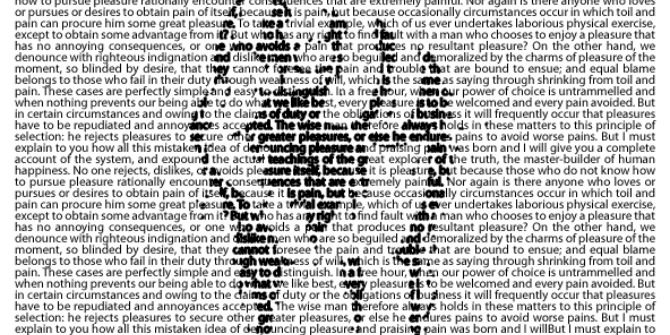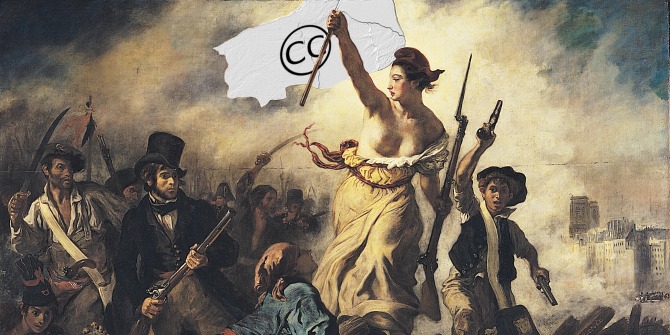
 Drawing on their experience in producing a new open access textbook/handbook of UK politics, Patrick Dunleavy and Alice Park outline some inescapable dilemmas around referencing paywalled materials, and how they can be overcome. They also outline how creative design changes can enhance the advantages of a fully digital, open access book for citizens, students, and teachers.
Drawing on their experience in producing a new open access textbook/handbook of UK politics, Patrick Dunleavy and Alice Park outline some inescapable dilemmas around referencing paywalled materials, and how they can be overcome. They also outline how creative design changes can enhance the advantages of a fully digital, open access book for citizens, students, and teachers.
What does doing genuinely open access social science mean? We can all agree that to maximise public engagement the materials produced (books, articles, or other information) need to be completely free to download from any PC, tablet, or smartphone, easily viewable on different devices, and preferably good-looking and well edited. This is no easy thing to accomplish. For our new textbook-cum-citizens’ handbook of British politics, The UK’s Changing Democracy: The 2018 Democratic Audit, published today, we were lucky enough to be able to attract generous funding from the Joseph Rowntree Charitable Trust, plus publication by LSE Press, a brand new digital open access publisher.
And, of course, a digital textbook/handbook needs to be designed to appeal to the widest possible range of readers in a “pop science” mode, without an off-putting apparatus of endnotes (still less footnotes). We opted for having fully digital references, in the form of unobtrusive URL links, to connect readers to sources and to further information or evidence.
 But in seeking to inform citizens about UK politics, is it enough to simply make the primary text available open access, but then to provide reference links that may or may not lead readers to useful further information? What if we cite a print book or a paywalled journal article which means that ordinary citizens (and of course anyone in education or universities who does not have access to that particular item) instead come to a juddering halt in what they can learn further? This seems like building into our open access book dozens of elements that negate open access, that effectively declare to many readers: “sorry, but you’ve reached the end of the line on learning more here, because you are not one of the privileged university inhabitants for whom this academic work is properly designed”.
But in seeking to inform citizens about UK politics, is it enough to simply make the primary text available open access, but then to provide reference links that may or may not lead readers to useful further information? What if we cite a print book or a paywalled journal article which means that ordinary citizens (and of course anyone in education or universities who does not have access to that particular item) instead come to a juddering halt in what they can learn further? This seems like building into our open access book dozens of elements that negate open access, that effectively declare to many readers: “sorry, but you’ve reached the end of the line on learning more here, because you are not one of the privileged university inhabitants for whom this academic work is properly designed”.
To avoid this disguised elitism we set out to make not just our primary text but also all the evidence and sources that support the analysis as open and visible for readers as we can. This commitment must sometimes create a dilemma for any academic author, for whom it is vital to accurately cite the original, best, or most critically relevant source. Citing accurately and fully is an essential aspect of academic writing and professionalism and it fulfils many key professional functions. Using only or mainly OA sources in open social science texts may mean making different choices about what to cite. Potentially we might want to prefer those sources that are open over those sources that are most fundamental, salient, or otherwise “best” in context.
Referencing for everyone
Here is how we sought to manage this dilemma.
(i) Wherever possible we sought to link to digitally available OA sources. So far as we possibly could arrange it, whenever a reader clicks on our hyperlinks they should not go to a paywall, but instead to a useful source of further information or reading.
If a published journal article is open access from the outset then meeting this requirement is easy to do. If an article by authors from a UK university sits behind a paywall (as around three-fifths still do) the UK funding body now requires that it must be available somewhere in a “green” open access repository, if it is to attract any REF funding in 2021. This is a great help – although publishers’ embargo periods in social science remain ridiculously long.
But what if a source is an inaccessible published chapter or book, or if the author of a journal paper is overseas and not interested in REFability? Often here, though, authors have made available earlier versions of text in an open access university repository, or on sites like ResearchGate and Academia.edu, and these may be almost as helpful for readers as the final published text.
(ii) Where no freely readable version was feasible for papers or for books we instead linked to blogs, press articles, or other short pieces where the authoring academics outlined their work in accessible ways. (Students and academics with university library access can easily move on from these “intermediate” sources to accessing the full texts, if available to them.) A widely accepted academic practice now (increasingly taught in graduate school) is to always try to publish a blogpost to enlarge the readership for an article or book chapter – and there is plenty of advice on how to get this done speedily.
The biggest problem for our approach were costly books that are only available in print copy, or as ebooks inside university libraries, and whose authors have made no effort to disseminate their core messages in digitally accessible forms. To be frank, we tended just to cite them less, looking for equivalent alternatives if we possibly could.
However, sometimes books are key sources and here we wanted to give the widest possible range of readers a fuller idea of what these book authors are arguing. To do this we often linked to digital OA reviews of books, such as those on the LSE Review of Books blog – an indispensable open access source across the social sciences. (Again readers with university library access can easily move on from book reviews to access the full texts.)
(iii) For data and factual matters in our field we linked a great deal to official statistics, and to many invaluable open access reports and tables from the House of Commons Library and the Institute for Government. We also included many links to Wikipedia, reflecting the fact that its coverage is increasingly broad, reliable, and up to date – although we did carefully check the items used from here. Of course, this is easier in a book like ours, where the focus is on the latest data available, rather than, for example, historical sources.
(iv) In addition, for interested readers our book has a full set of conventional references at the end of the book, using a “non-blind endnote” approach. This is a variant from the “blind endnote” approach used in some “pop science” and general interest non-fiction books, where un-highlighted trigger phrases or words in the text have accompanying endnotes arranged in sequence at the back of the book. In our chapters the trigger words are instead visible as differently coloured links in the main text, for each of which we provide a conventional endnote with full publication details. This list includes a small number of non-OA sources which the chapter authors felt have especial (inimitable) value as sources or follow-on reading.
Navigating and sharing the text
The UK’s Changing Democracy is a big book (over 500 pages) and includes 37 chapters, so perhaps its scale could seem off-putting for readers. However, every chapter is also published in stand-alone form, for readers interested in just one topic. Chapters are separately indexed, can be separately downloaded, and have their own DOI to help readers find them easily.
And because the book is available in digital form readers have several other main ways of instantly finding the things that they are interested in. They can use the normal digital search keys for that source (e.g. in PDF, Kindle, or epub versions) to go straight to any bit of text they are interested in (such as a topic, a theory, the name of an institution or organisation, or even a person). The book also has a full index where clicking on any page number takes readers straight to relevant main text.
Finally, as part of our commitment to open science The UK’s Changing Democracy has a Creative Commons (CC BY-NC-ND 4.0) license. This means that academics, teachers, and librarians are completely free to reuse all our materials (including any of the tables, graphs, or diagrams we have produced) in their own teaching and non-commercial publications – so long as each use is accompanied by a readable acknowledgement of the source. For any commercial reuse, going beyond extracts for the purpose of commentary or review, users can contact LSE Press.
We hope that readers may download our book (even if they are not interested in UK politics!) and just examine how these features work, and whether they seem worthwhile and academically acceptable in an open access text and handbook of this kind. We would love to get comments and perhaps hear of similar or related initiatives. The social sciences are still in the early stages of freeing up access to our knowledge, and growing our external impacts. Collectively we have only made some first (“baby”) steps on the way to thinking through new and genuinely democratised forms of communication. There is surely much more innovation still to come.
The UK’s Changing Democracy: The 2018 Democratic Audit (DOI: 10.31389/book1) publishes today with LSE Press. It is available for download in all ebook formats. Readers can also download PDFs of individual chapters.
Featured image credit: John-Mark Smith, via Unsplash (licensed under a CC0 1.0 license).
Note: This article gives the views of the authors, and not the position of the LSE Impact Blog, nor of the London School of Economics. Please review our comments policy if you have any concerns on posting a comment below.
About the authors
Patrick Dunleavy is Professor of Political Science and Public Policy at the London School of Economics, and Centenary Professor at the University of Canberra. He is co-editor of The UK’S Changing Democracy (LSE Press, 2018), published free and open access on 1 November.
Alice Park is Managing Editor of the Democratic Audit blog and co-editor of The UK’s Changing Democracy.








That is a good improvement for UKs Democratic Audit 2018 and the UKs Changing Democracy …facing BREXIT March 2019, …that LSE scientists and not limited to LSE, i think agree that Open Accessibility it means no borders to getting data science as long as academy reasonable , ….when social scientists thought for re evaluating , redesigning, re shaping, re implementing , re finding and reforming a past to better today and become more and more …better for future British after Brexit is an ideal British as Big Nation remarkable in the world under consequently refers to multicultural and multietnicity background as invaluable beneficiary as well….great to Dr.Patrick Dunlevy and all colleagues at LSE and politic scholars ….